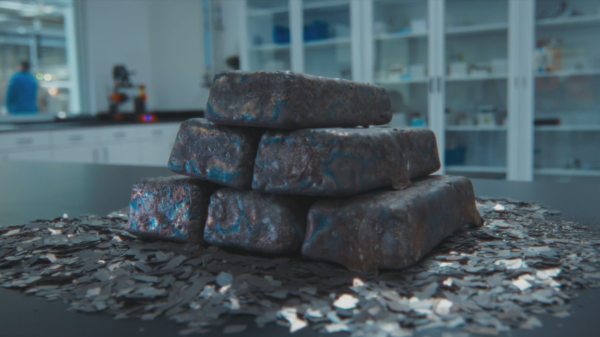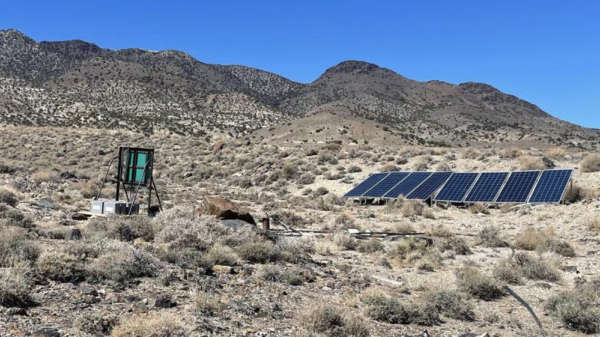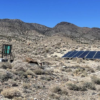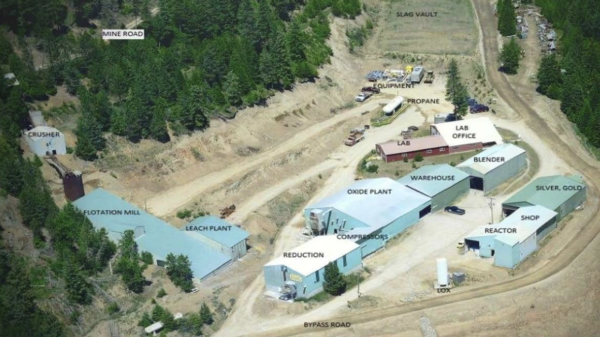The African continent is home to around 30 per cent of mineral reserves worldwide, and as the energy shift continues, more African nations are looking to raise the cost of their mineral exports by refining them locally.
Africa is vital in sourcing crucial materials like cobalt, lithium, manganese, graphite and nickel. These materials are essential for transitioning from fossil-based energy systems to renewable energy sources. They are key elements in developing various technologies, including electric vehicle batteries, solar panels and smartphones.
According to a report by the International Energy Agency (IEA), in 2017-2022, the demand for lithium tripled while the demand for cobalt grew by 70 per cent and nickel by 40 per cent.
The Democratic Republic of the Congo (DRC) is a major global supplier, contributing nearly 70 per cent of the world’s cobalt supply. However, the region has faced recent challenges due to political instability. Additionally, the DRC and Rwanda collectively account for half of the world’s tantalum production.
The continent produces 8 per cent of oil, holds 40 per cent of gold and around 90 per cent of chromium and platinum.
Within the African Continental Free Trade Agreement, nations established a framework for active participation and committed to becoming valuable contributors to global value chains in the processing and manufacturing essential minerals.
Africa’s abundant natural resources offer a promising chance to be central in attracting productive investments that fuel domestic and regional industrial growth and advancement. To harness this opportunity, experts say African nations must enhance their manufacturing capabilities and expand production and exports by fostering domestic and regional connections and value chains.
According to a report by the World Bank Group, over a dozen nations, including DRC, Nigeria, Tanzania, Zimbabwe, Ghana and Namibia, have already intermittently stopped or banned raw, non-processed mineral exports.

Map via The World Mining Congress
Read more: UAE invests $6.3B into renewable energy initiative in Africa
Africa is a key player in reorienting supply chains from China
The combination of key mineral deposits in African countries and the U.S. wanting to reorient supply chains away from competitors like China can be the foundation for a new economic and strategic relationship. China dominates the global market in refining strategic minerals, and the United States and Canada rely heavily on it for imported mineral commodities.
According to a recent study by the Brookings Institution and Results for Development, China refines 68 per cent of nickel globally, 40 per cent of copper, 59 per cent of lithium, and 73 per cent of cobalt. China also accounts for 78 per cent of the world’s cell manufacturing capacity for EV batteries.
The recent United States Inflation Reduction Act (IRA) offers a tax credit to Americans who buy electric vehicles with batteries containing a certain percentage of critical minerals extracted or processed in the U.S. or any country “with which the United States has a free trade agreement.” The country currently has 20 free trade agreements in effect but only one with an African nation, Morocco, which has the world’s largest known phosphate reserves.
Read more: IAMGOLD sells its African assets to Managem for US$282M
Read more: Fortuna Silver Mines installs mill and substation at West Africa site
List of African nations banning unprocessed lithium exports expanding
Nigeria spearheaded the raw-ore export ban in 2022 when Minister Olamilekan Adegbite issued the ban to end the “plundering of the continent for raw materials” and to incentivize local refining before exporting. The major crude oil producer depends on imports from overseas refineries and is trying to avoid the same issue in the mining sector.
Meanwhile, the DRC banned exports of copper and cobalt intermittently since 2013 but has issued regular waivers since then. Most recently, the country revoked its authorization for its first gold refinery –Congo Gold Ragginerie Sarl– days before its planned inauguration in July.
According to The Africa Report, Tanzania will join other countries in banning unprocessed lithium exports. As of next June –reads a letter dated June 8– Tanzania will ban unrefined mineral exports as it pushes local lithium miners to refine inside Tanzania and increase the value of the minerals by at least 5 per cent before export.
#Tanzania will end the export of unrefined #lithium from May 2024 and require miners to add value, a letter from the country’s minerals ministry shows.https://t.co/N0ez8Ioxh4
— The Africa Report (@TheAfricaReport) November 2, 2023
This year, Van den Arend, a former Deutsche Bank executive based in Frankfurt, established StraMin, a company that specializes in purchasing essential minerals like copper, beryllium, nickel, graphite, lithium, cobalt, coltan and tin directly from miners at their production cost.
These miners, who hold 70 primary licenses in Tanzania, also get a share of the profits when StraMin resells the minerals. By consolidating the output of small and medium-sized mining enterprises, the company makes its operations more appealing to global buyers and investors.
Arend said his approach not only benefits the miners economically but also empowers the small-scale mining sector, which Van den Arend believes is often underestimated in its importance.
Key players in the country include the American firm Titan Lithium Inc. (OTC: CHSG) and Australian multinationals Liontown Resources (ASX: LTR) and Cassius Mining Ltd. (ASX: CMD).
Read more: Lithium South Development first production well installed at Hombre Muerto lithium project
Read more: Lithium South Development expands production goals, updates PEA on Hombre Muerto lithium project
Zimbabwe’s lithium exports have increased dramatically
Zimbabwe’s lithium exports have grown tremendously, from US$1.8 million in 2018 to $70 million in 2022. The lithium and battery minerals sector has significantly contributed to Zimbabwe’s economy, generating US$209 million in export receipts in the first quarter of 2023.
“The demand for materials used to manufacture lithium-ion batteries has increased dramatically,” Mines and Mining Development Minister Soda Zhemu said at a mining conference in Bulawayo on Wednesday.
“Due to this demand, new investors, both local and foreign, have entered the sector to mine, process and export lithium and battery minerals from Zimbabwe.”
Last December, Zimbabwe banned the export of unprocessed raw lithium. With the ban, Zimbabwe wanted to encourage local metal processing and position itself as a big player in EV battery production.
Financial analyst Persistence Gwanyanya told local media that the increase in mineral exports and investor confidence in the sector had been a result of a conducive environment ushered by the government.
“The government has implemented a number of measures in the economy, including amending legislations such as the Indigenization and Economic Empowerment Act and the establishment of Zimbabwe’s Investment Development Agency,” Gwanyanya said.
In Zimbabwe, several companies are involved in the exploration and development of lithium resources. Prospect Resources started operations at the Arcadia Mine in Arcturus in 2018. It has attracted attention by securing a significant $422 million deal with China’s Huayou for Zimbabwe’s lithium assets.
Chinese companies were recently granted licenses in Zimbabwe, potentially bringing in around $2.79 billion in investments, mainly focused on mining and energy. Zimbabwe is known to have the largest lithium reserve in Africa and the sixth-largest in the world, making it a significant player in the global lithium market.
"The mines ministry said Wednesday the country has earned $209 m in revenue from #lithium exports in the nine months to September."
Assuming an average LCE price of $35K/t, Zimbabwe would have produced 58% more LCE in this period than in the whole 2022. https://t.co/eQshP7boYZ— Juan Carlos Zuleta (@jczuleta) November 2, 2023
Read more: China to invest US$2.8B in Zimbabwe’s lithium and resource sectors
Read more: Caledonia Mining completes acquisition of large Zimbabwe gold project
Ghana grants first lithium mine lease
During the Bloomberg New Economy Gateway Africa conference in Morocco in June, Ghana’s Minister for Lands and Natural Resources, Samuel Jinapor, said the country is set on processing its lithium before exporting it. This is part of Ghana’s commitment to create jobs, generate more revenue for its Gross Domestic Product (GDP) and benefit significantly from the new paradigm of renewable energy.
The African nation recently gave the Australian miner Atlantic Lithium Limited (AIM: ALL) (ASX: A11) (OTCQX: ALLIF) the lease for the country’s first lithium mine in Ghana. The country’s sovereign wealth fund will invest almost USD$33 million in the mine and take a minority stake from Altantic Lithium. The company will also work on developing a lithium processing plant.
Atlantic Lithium is delighted to announce that a Mining Lease has been granted for the Company’s flagship Ewoyaa Lithium Project in Ghana, marking a major step towards production.
Full announcement here: https://t.co/Wd54EAs7Id
#ALL #A11 $A11 $ALLIF #Lithium #Ghana #Mining pic.twitter.com/GYmjTeX9FR— Atlantic Lithium (@AtlanticLithium) October 20, 2023
Namibia unprocessed lithium export ban may violate trade laws
Last June, Namibia banned the export of unprocessed critical minerals months after signing a memorandum of understanding in November 2022 with the European Union to develop its supplies of rare earth minerals.
“Cabinet approved the prohibition of the export of certain critical minerals such as unprocessed crushed lithium ore, cobalt, manganese, graphite and rare earth minerals,” Namibia’s information ministry said.
Namibia has large lithium deposits and rare earth minerals, including dysprosium and terbium, which are needed for magnets in EV batteries and wind turbines. The country is a top global producer of uranium and diamonds, but its battery metals have left more people talking as the energy transition continues.
“Thanks to its abundant renewable energy potential, Namibia is becoming a front-runner in the green hydrogen space. The EU is proud to be a partner in this transformative journey towards green industrialization,” European Union Commission president Ursula von der Leyen said.
Under the EU-Namibia partnership, the EU will invest €1 billion to develop sustainable raw materials value chains and renewable hydrogen and support an upcoming study to develop Port of Walvis Bay into an industrial and logistics hub for the region.
Critical minerals firms operating in Namibia include Prospect Resources, Arcadia Minerals and Askari Metals. Celsius Resources and Namibia Critical Metals are developing cobalt and rare earth projects.
Read more: Atlantic Lithium’s new mine is African alternative to Chinese lithium dominance
Read more: Atlantic Lithium receives mining lease for Ghana’s first lithium mine
How does this impact investment in Africa?
The Natural Resource Governance Institute (NRGI), a non-profit policy institute, cautioned that relying solely on blanket bans for critical mineral exports would not be adequate to sustain the essential economic growth required on the continent.
Analysts from the organization pointed out that African nations must establish mineral processing infrastructure, including a battery value chain and implement robust frameworks to ensure the effective utilization of tax revenues. Failing to do so could discourage trade partners and curtail investment in the mining sector.
Silas Olan’g, NRGI’s Africa energy transition advisor, told Reuters that any mineral-rich African nations are known for experiencing a “resource curse,” with bad governance linked to “corruption, environmental degradation, and human rights abuses.”
Export bans will be beneficial if governments shift processing power to local sources and use their renewable energy capacity to power it, said Olan’g.
“Africa should not be bothered about China’s processing,” he said. “We should be bothered about how we utilize our minerals for the benefit of our people.”
Africa’s shift towards processing critical minerals locally reshapes the global supply chain for renewable energy technologies. This move has the potential to attract substantial investments and create economic opportunities as Africa leverages its vast mineral reserves.
However, for sustained success, African nations must ensure efficient processing infrastructure and transparent governance to maximize the benefits of this valuable resource.














